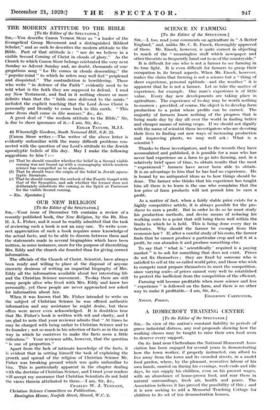SCIENCE IN FARMING
[To the Editor of the SPECTATOR.] SIR,—I, too, read your comments on agriculture in " A Better. England," and, unlike Mr. C. R. Enock, thoroUghly approved of them. Mr. Enock, however, is quite correct in objecting to much of the " meaningless stuff which -newspaper and otheitheorists so frequently hand out to us of the countryside."
It is difficult for one who is not a farmer to see farming in its true light. It is even difficult for farmers to grasp their occupation in its broad aspects. When Mr. Enock, however, makes the claim that farming is not a science but a thing of sheer experience, personal aptitude—and the weather " it is apparent that he is not a farmer. Let us take the matter of experience, for example. One man's experience is of little value. Every day new developments are taking place in agriculture. The experience of to-day may be worth nothing to-morrow ; provided, of course, the object is to develop farm production to a point where profits can be earned. The majority of farmers know nothing of 'the progress that is being made day by day all over the world in finding better and cheaper means of raising crops. If we should not dignify with the name of scientist those investigators who are devoting their lives to finding out new ways of increasing production and improving plants, we may well ask : What is a scientist ?
Thanks to these investigators, and to the records they have accumulated and published, it is possible for a man who has never had experience on a farm to go into farming, and, in a relatively brief space of time, to obtain results that the most " experienced " farmers have never been able to obtain. It is an advantage to him that he has had no experience. He is bound by no antiquated ideas as to how things should be done. The farmer who thinks that his experience has taught him all there is to learn is the one who complains that the low price of farm products will not permit him to earn a profit.
As a matter of fact, when a fairly stable price exists for a highly competitive article, it is always possible for the pro- ducer to earn a profit. But in order to do so he must study his production methods, and devise means of reducing his working costs to a point that will bring them well within the limits to which he is held. This is being done every day in factories. Why should the farmer be exempt from this economic law ? If, after a careful study of his costs, the farmer finds that he cannot produce a particular crop and sell it at a profit, he can abandon it and produce something else.
To say that " what is ' scientifically' required is a paying market " is to ask for something that does not exist. Prices do not fix themselves ; they are fixed by someone who is satisfied to sell at the so-called world price, and those who wish to compete' must prepare themselves to meet the competition. since varying scales of prices cannot. very well be established to protect the inefficient from the competition of the efficient, Farming will become profitable when more science and less " experience " is followed on the farm, and there is no other way to make it profitable.—I am, Sir, &c.,


































 Previous page
Previous page